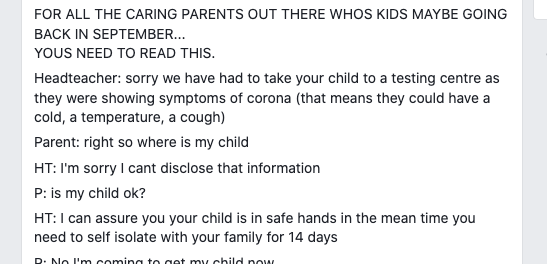How British grannies are spreading far-right conspiracy theory memes on Facebook
A headteacher in Stoke-on-Trent told me that, alongside ensuring a COVID-safe return to school for her pupils this September, she’s having to reassure parents that their children will not be forcibly taken away and isolated in a secret location if they start coughing in class.
The headteacher keeps getting sent a Facebook post warning parents to “wake up” to the threat in the UK’s Coronavirus Act. “Is this true, can you take my child?” she is asked.
The Facebook post those parents had seen began going viral mid-August. It’s one of several similar posts seen in the UK and Australia, and follows a pattern in many posts linked to the QAnon conspiracy theory.
These often include a direct appeal to parents, challenging the reader to do their own research to “prove” the veracity of the claim, a call to defend individual rights against big government, elites, or some undefined “they”.

Despite being quickly fact-checked and tagged as false, this and related posts which use the hashtag #SaveTheChildren are still circulating and the phrase “covid act 2020 children in school” still comes up as an autofill option if you search for “covid act” on Google.
The power of memes
For the past five years, my research has looked at how strangers talk with each other about politics on Facebook. I’ve focused on four English constituencies – Stoke-on-Trent Central, Burton and Uttoxeter, Bristol West and Brighton Pavilion – tracking conversations through public pages, posts and public information on people’s timelines and profiles.
Through the 2015, 2017 and 2019 UK general elections, I saw the increased polarisation of those Facebook conversations and with it increased incivility, partisanship and sectarianism. I was struck by the rising use of memes and how a handful of core themes made their way from meme to belief. During the 2019 election, I noticed how memes from far right US Facebook pages were being posted and spread via people in the UK constituencies I was studying.
I recently decided to explore how the upcoming US election might be translating into partisan ideas on Facebook in the UK. I decided to focus on one meme, and the individual Facebook users who cared enough about that issue to share or comment publicly – and see where it took me.
So, in late August, I returned to Facebook after a seven-month gap and picked the meme that happened to be at the top of my timeline – a post from the group Migrant Watch shared by the page of UKIP Brighton & Hove. This was consistently one of the most active meme-seeders among the constituency party Facebook groups I follow.
I’d found links during the last election between the active seeding of anti-migrant, anti-immigration memes by UK users and US far-right organisations and individuals, and so I expected to find similar links through that meme. But what I hadn’t expected to see was for the meme to lead me to UK mums and grandmothers engaging with QAnon conspiracy theories from the US.

QAnon conspiracies
Of the 45 people to comment on this Migration Watch meme shared by Brighton & Hove UKIP – 27 were women and most, from what I could tell from their profiles, were middle-aged grandmothers. When I looked at what other content these women were sharing, I found memes about anti-animal cruelty, anti-Black Lives Matter protests, anti-BBC proms and content in favour of Brexit.
Some of the women were also worried about the threat to “our” children posed by paedophile rings. And in this they demonstrated the next level of political meme sharing – freely interacting with content from both the UK and the US.
For one woman that meant sharing conspiracy theories from Mama Wolf, one of the Facebook accounts circulating QAnon content. One of these was entitled “ Epstein Islands frequent flyers ” a hotch-potch of unfounded accusations linking Hilary Clinton, Oprah Winfrey, Bill Gates, Madonna, the Queen, and other (mostly black or Jewish) “elites” to the late Jeffrey Epstein, a global child trafficking network, drugs harvested from children’s blood, and secret messages coded into Trump’s press briefings on his plans to save the children.
I found one of the same Facebook users who had shared the Migration Watch meme also sharing a post calling for people to flood the BBC’s Facebook page on August 25 with the #saveourchildren tag. “They won’t cover child trafficking so we will bring it to them. It’s time to take this up a level,” said the meme.
Hidden radicalisation
The bubble communities we inhabit on Facebook shield us from alternative views to our own, while also making it easier for views to be reinforced, enhanced – groomed even – towards more radical positions.
Facebook encourages pools of the like-minded, whether through architecture that encourages what the activist Eli Pariser’s termed “ filter bubbles ”, or what the psychologist Daniel Kahneman called “cognitive ease” – our willingness to believe ideas that are familiar, comfortable – easy – to believe, and to avoid ideas that would take effort to accept. It’s also possible to game Facebook’s algorithms to manipulate public opinion, as the investigative work of journalists such as Carole Cadwalladr and Craig Silverman has shown.
But seeing a radical meme isn’t enough to trigger more of the same content, it’s how we interact with the content that matters to Facebook. The depth of interest needed to comment and then share a political idea will trigger more of the same and, potentially, take the user through increasing levels of radicalisation.
A slightly racist granny can quickly become groomed towards adopting more radical views. Or a fellow mum be taken from conspiracy theories about the Coronavirus Act to those about Epstein’s island. And then that can lead to thousands of protesters to march in London in late August against mask wearing and in defence of a “truth” only they are being shown.
It can be tempting to dismiss the anti-mask protesters or groups marching to Buckingham Palace to #SaveOurChildren as a few thousand cranks in a sea of sensible people. But we do not know the size of the iceberg – beneath each visible protester may be thousands of partial believers, including an unknown number of grandmothers helping QAnon to grow.

To find out more about the history of conspiracy theories, how they spread and how dangerous they are, listen to our Expert guide to conspiracy theories, a series by The Conversation’s The Anthill podcast. Listen here, on Apple Podcasts or Spotify, or search for The Anthill wherever you get your podcasts.
Sue Greenwood, Associate Head of Production, York St John University
This article is republished from The Conversation under a Creative Commons license. Read the original article.


